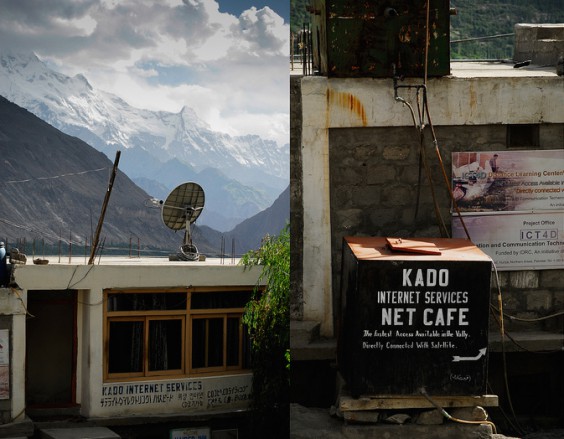Digital Censorship in Egypt and Pakistan
by Bina Shah / June 5, 2015 / No comments

Internet Cafe in Karimabad (Hunza), northern Pakistan. Photo via Flickr user: · · · — — — · · ·.
Pakistani citizens rallying against a proposed cybercrime bill is monumental news for Internet freedom in authoritarian regimes.
The story of Pakistan’s proposed Electronic Cybercrime Bill PECB (2015) is one that’s becoming common in many countries where the Internet and social media have played important roles in political protest. Governments in countries where there is political instability are confronting citizens denied the right to physically protest in the streets, and coming down hard on their online freedoms. Yet digital rights activists in other countries should take what happened in Pakistan in May 2015 as proof that citizens can make their voices heard in the vital debate on digital censorship.

- Pakistan is a country of contradictions – full of promise for growth, modernity and progress, yet shrouded by political, social and cultural issues that undermine its quest for identity and integrity. My bi-monthly column “Pakistan Unveiled” presents stories that showcase the Pakistani struggle for freedom of expression, an end to censorship, and a more open and balanced society.

- Bina Shah is a Karachi-based journalist and fiction writer and has taught writing at the university level. She is the author of four novels and two collections of short stories. She is a columnist for two major English-language newspapers in Pakistan, The Dawn and The Express Tribune, and she has contributed to international newspapers including The Independent, The Guardian, and The International Herald Tribune. She is an alumnus of the International Writers Workshop (IWP 2011).
Citizens in many developing nations have been turning to social media for years now in order to share information about human rights abuses, reach out to other countries and international human rights organizations, and circulate petitions demanding various concessions and agreements from their own governments. Moreover, they can do this with complete anonymity from the safety of their own homes, which takes the power equation between government and citizen and turns it on its head. Authoritarian governments are made uncomfortable by this equation, and are attempting to push back.
Take Egypt, whose government this year is trying to formulate a new cybercrime law that restricts freedom of expression. Bloggers have been jailed before: Karim Amer went to jail in 2007 for “insulting Islam and the President.” The tension between online activists and bloggers and the government has grown over the years, with the government attempting to even shut down the Internet during the Arab Spring protests in January 2011. As Ragab Saad puts it, “the dispute continues primarily between two camps: one seeking to tighten its grip on Internet freedom through regulation, the other advocating for the protection of online freedom of expression.”
In Pakistan, as well as in Egypt and other countries like the UAE and Saudi Arabia, the government faces the same kind of debate in a society that has grown ever more aware of its collective voice, and ever more eager to use it. Add to this an environment where Internet usage is poised to really explode. Greg Lockwood of Piton Capital, who has just invested in Pakistan’s IT company Naseeb Networks, describes Pakistan as a country with an “extraordinary demographic—almost 200 million people of which more than half are under the age of 24— [with a] rapidly rising internet and smartphone penetration and high rate of university education and increasing urbanisation.”
Egypt’s government has drafted a cybercrime law that is ostensibly meant to protect citizens from online dangers such as “incitement, terrorism, religious intimidation, and the use of personal photos and videos for blackmail.” The law, in draft form, is currently being evaluated by a committee consisting of government representatives from various ministries, as well as Egypt’s General Intelligence Agency, who want to make it gel with Egypt’s Penal Code. However, vague language and ambiguity means the law can be used “as a pretext to prosecute political opponents and human rights defenders on vague charges such as publishing news, information, or false rumors, if it is found to disturb public security.”
In Pakistan, former President General Pervez Musharraf enacted a Prevention of Electronic Crimes Ordinance in 2007. It too was ostensibly meant to protect citizens, but it gave the government legal cover to block websites that expressed criticism of Musharraf’s government. The law lapsed in 2009 and was never renewed. To fill the gap in Pakistani law, government officials decided to put together a new cybercrime bill in 2012, and the Pakistan Software Houses Association (PASHA) offered to help the government. Ministries, legal experts and civil stakeholders from the IT industry and digital rights groups sat down to finalize a comprehensive document. The entire process took three years, and in 2014, all stakeholders agreed on the bill.
Then, this year, the IT Ministry amended the document without consulting any stakeholders. A 44-page document was cut down to 13 pages. Gone were all the legal clauses that maintained the delicate balance between protecting people from online crime and protecting their right to free speech. Now, especially with Article 31 in the 2015 draft, the government gave itself vast powers to block any site that was deemed inappropriate, vulgar, or against national security or the “glory of Islam.” The stakeholders were not even aware that these changes had been made until news began to spread that a new draft had been approved by the NA Standing Committee on the PECB, without all its members present. The bill was ready to be sent to Parliament and was voted into law in April 2015.
Such is the power of the Internet in Pakistan, though, and such is the cohesiveness of small digital rights activists and other stakeholders that once word was out, people quickly rallied to counter the government’s move. Some journalists (including myself) wrote editorials about the “draconian cybercrime bill” and the sneaky way the IT Ministry was attempting to get it passed. People began to voice their protest on Twitter and Facebook to whichever government officials were on social media. They signed an online petition against the bill.
At the same time, digital rights groups like the Digital Rights Foundation (whose head, Nighat Dad, has just been named a TIME Next Generation Leader), Bolo Bhi, and IT groups like PASHA and the Internet Service Providers Association of Pakistan (ISPAK) moved into action, informing their government contacts about their condemnation of the new version of the PECB. Members of the government in the opposition also got involved, and agitated for a public meeting with stakeholders and the members of the NA Standing Committee on the PECB.
Finally, the day of reckoning came, although the “public meeting” actually turned out to be a closed meeting to which only a select few were invited. When the attendees arrived at the Parliament building, the guards almost did not allow them to enter; only the intervention of an opposition MNA—Shazia Marri of the PPP—made it possible to join the meeting. The meeting lasted three hours. At the end, the head of the NA Committee, Captain Muhammed Safdar, announced that the bill would not be tabled in Parliament, but instead would be further evaluated by the government and civilian stakeholders.
This may seem like a small victory, but its significance can’t be emphasized enough; citizens raised their voices against an unjust bill, and the government was actually forced to listen to them. This is actual democracy in action, and it represents uncharted territory for Pakistan, where military dictatorships and unheeding civilian governments have frustrated its citizens for decades. It’s hard to say whether Egyptian activists will be able to achieve a similar victory in their own fight against the Egyptian cybercrime bill, but they should definitely look to Pakistan’s example for inspiration in the months to come.




